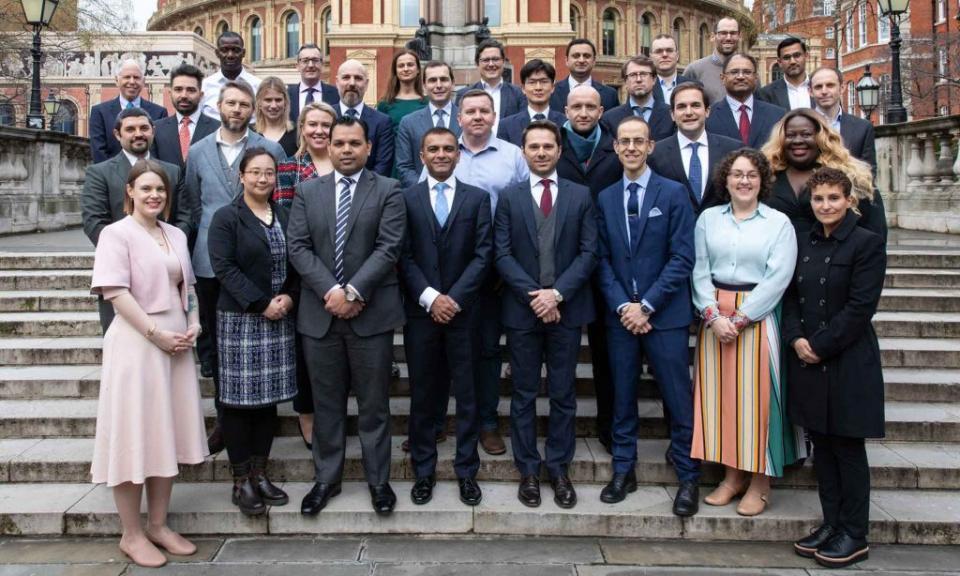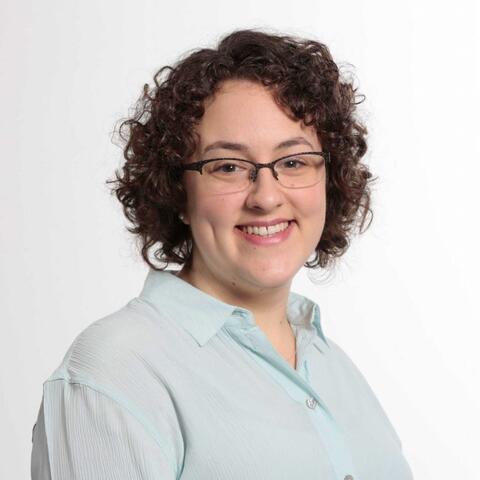
Published
Blog type
In February, we welcomed the latest Executive MBA cohort to Imperial College Business School as they embark on their two-year MBA journey. This programme is made up of senior executives who are ready to develop their skills and knowledge to succeed in a technology-driven world.
Taught over 23-months part-time in a blended learning format, the programme gives candidates a thorough knowledge of essential business disciplines, opportunities to specialise in their areas of expertise and international immersions to develop their global perspective on business.
Get to know our new class and find out what they got up to during induction week.
Cohort profile
Some quick stats on the new class:
-
Nationalities represented: 18
-
Female: 25%
-
Work experience: 15 years
Our new class are a diverse group, they represent 18 nationalities and 13% of the cohort reside outside of the UK, commuting one weekend a month for classes from America, the Middle East, Nigeria, all over Europe and more.
Further, students join the Executive MBA from a wide variety of sectors which adds depth to class discussion and allows them to gain insight from their peers who have specialised industry-specific knowledge.
Induction week
This induction week marks the last of the popular George Yip, Programme Director of the Executive MBA, who in March this year will be retiring. Over the last four years in this role, George has developed the Executive MBA programme to ensure it prepares candidates to deal with the challenges of an increasingly uncertain and global work environment.
George leaves the programme in very capable hands, passing the baton to Dr Ian McKenzie. Ian holds a BSc in Engineering and a PhD in Aeronautical Engineering from Imperial College London, as well as an MBA from Harvard Business School. Speaking to the new class, Ian said:
I’m really delighted to be taking over this role as Programme Director. I’ve taught on the Executive MBA, Strategy as it happens, for the last three years. I’ve gotten to know the groups really well. I’ve really enjoyed that and I’m looking forward to this wider remit.
I’m unusual in the sense that I’ve got one foot in the academic camp and one foot in the practitioner camp. But hopefully that is pretty relevant because a lot of what we do here is thinking about how you apply the great ideas the academics have come up with to real business problems, and helping you develop your careers.
Following welcomes from Dean Professor Francisco Veloso, Associate Dean Leila Guerra, and a programme introduction by George Yip, induction was in full swing. There were many exciting activities throughout the busy three-day induction, so we’ve wrapped up some of the highlights.
Breaking the ice
Somaya Ebrahim, Senior Programme Manager of MBA Programmes, led an icebreaker activity that went beyond the usual ‘introduce yourself’. The ‘maximise your worth game’ engaged students in a fast-paced trading game; a great way to get students to interact with each other and quickly break the ice with their peers.
Design thinking workshop
Ileana Stigliani, Associate Professor of Design and Innovation led an interactive workshop to introduce students to the design thinking methodology. The skills learned in this session will be invaluable for students going forward on their MBA journey.
Guest speakers
John Allan CBE, Chairman of Tesco, Barratt Developments, and London First, delivered a keynote speech, and William Knottenbelt, Professor of Applied Quantitative Analysis presented the first talk in the Future Vision series.
MBA candidate Robert Oxley said:
It was fantastic to have a design thinking workshop, and the energy Ileana bought was amazing. It was a privilege to have John Allan CBE share his professional experiences as CEO and take questions from the group. It was great to learn about cryptocurrencies with William and to hear from a startup who is putting graduate diplomas and transcripts on the Bitcoin Blockchain.

Beginning the Executive Leadership Journey (ELJ)
Students were introduced to the Executive Leadership Journey by Fiona Sandford, Director of Strategic Projects and Ceri Willmott, Career Consultant and Careers Lead for the Executive MBA. Running throughout the Executive MBA, the ELJ equips leaders to deal with the challenges of our fast-changing world. This induction week session is just the first step in a challenging yet rewarding two-year leadership journey on the programme.
Socials
It wouldn’t an induction without opportunities for students to mingle with their peers outside of the lecture theatre in a more relaxed environment. In addition to a welcome dinner, students met with the Executive MBA 2018 cohort who were able to share anecdotes and advice with the new class over bowling and drinks.
Rachel Kirkham, MBA candidate said:
Induction week was intense and exhausting but also really fun. It was great to meet my classmates and syndicate team; my cohort is a diverse and interesting group of people, and I’m looking forward to learning from them and getting to know them better over the coming months.
Following induction week, students will join us for one weekend a month on campus where they will begin their studies. This is just the beginning of an exciting, intense but rewarding Executive MBA journey.

Elizabeth Alimena
Language Licensing Director at Oxford University Press
Why did you decide to study an Executive MBA at Imperial College Business School?
Imperial College Business School is the only institution I applied to after looking at several options for my Executive MBA. I selected Imperial because of its focus on innovation and technology, which will help me to develop skills and ways of thinking that are critical for business today and in the future. Imperial is perfectly positioned as the leading European STEM university to grow a strong network.
One of my motivators for getting an Executive MBA is the energy and increased focus on empowering and promoting women to senior-level executive roles. This has been particularly prevalent in the UK, where the statutory gender pay gap reporting is helping to drive this conversation and action. I was humbled to receive the 30% Club’s Inspiring Women Scholarship, and look forward to gaining skills from the programme that will give me an advantage in the board room.
What skills are you hoping to gain from your MBA?
I’m hoping to come away from this programme with an improved approach to decision-making and assessing and taking risks, especially through increased financial literacy. I’m also excited to gain experience in areas such as human-centric design thinking, which I wouldn’t have a chance to do in my day-to-day work.
Vikram Badhwar
Group Head of Operations Technology at Nando’s
Why did you decide to study an Executive MBA and why Imperial College Business School?
I am at a stage in my career where I actively want to learn and challenge myself outside of work. I feel that gaining a holistic understanding of business will make me a better leader and business partner. With over 11 years’ management experience and an employer that is willing to sponsor me, I feel ready to undertake and get the most out of an Executive MBA. The university’s focus on technology and innovation makes an MBA at Imperial very relevant and appealing to me.
How will you apply your MBA studies/learnings to your role?
I work in a global role for a federated business and over the course of the Executive MBA I’ll get the opportunity to apply what I learn to add more value and improve global/market dynamics.
Rachel Kirkham
Head of Data Analytics at the National Audit Office
Why did you decide to study an Executive MBA at Imperial College Business School?
I chose Imperial because the Business School has a strong emphasis on entrepreneurship and technology. I am also keen to explore links with the wider college, particularly the Data Science Institute. Imperial is at the cutting edge of a range of exciting technologies, and I’m looking forward to soaking up as much information as possible. I chose an Executive MBA because I wanted to combine work and study, and I was also attracted to the Executive Leadership Journey that runs alongside the programme; it is well structured to develop the soft skills needed to be an effective leader.
How will you apply your MBA studies/learnings to your role?
I’ve already applied some of the lessons learned in our Design Thinking workshop during induction at work! In seriousness, one of the advantages of an Executive MBA is the ability to put into practice your learnings immediately and experiment with different approaches to business problems. I’m lucky to have an employer that lets me try new things at work, so when I spot an opportunity to apply something I’ve learned at the Business School, I will do.
Robert Oxley
Product Innovation Manager at Mastercard
Why did you decide to study an Executive MBA at Imperial College Business School?
Imperial was the only business school I applied for because I was looking for a programme that would provide me with three elements that I believe are fundamentally important; technology-driven, international and flexible. My background is financial services, corporate finance and product innovation. As my career has progressed, the advances in technology, and the disruption these advances have made to entire sectors, have focused my mind on the importance of understanding change. The digital economy has democratised international trade and I believe that an international network is crucial to success.
I want to gain the skills and tools that enable me to drive innovation, identify opportunities and apply these learnings to my current and future roles. The developments in EdTech mean that distance learning is widely available, but the blended learning structure of the Executive MBA at Imperial was significant in my decision to take on this challenge.
How will you apply your MBA studies/learnings to your role?
My hope is that the Executive Leadership Journey will give me the confidence to build my personal brand, allowing me to play to my strengths as well as understand my weaknesses. This will impact the teams I will lead in the future, and I can already see how important active participation in Mark Kennedy’s Organisational Behaviour module will be.
Looking further ahead, and a question that was posed to the syndicate group, is what do you want to do with the Executive MBA? For some it was promotion, for others it was a new job or career, for me it is both. I’ve been with my current employer for six years, I am emotionally invested, but I am seeking new challenges. Whether they rise internally or externally is to be seen, but for now, I have plenty to keep me occupied.
